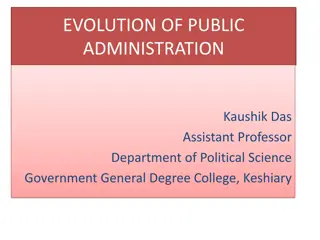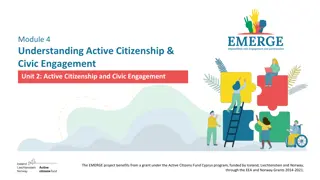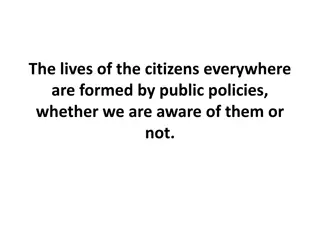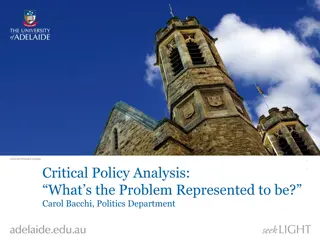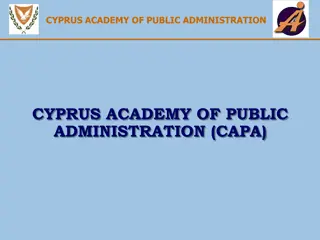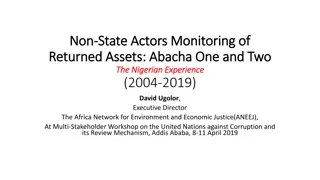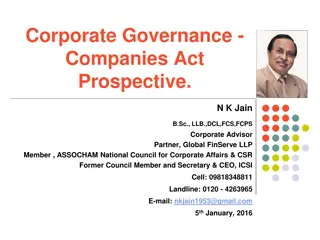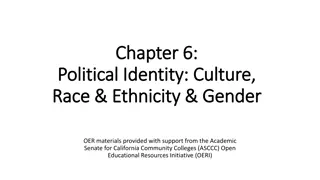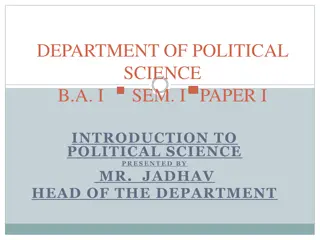Challenges and Governance in Political Science: Exploring Policy, Civil Society, and Public Administration
Delve into the multifaceted realm of governance and political science, tackling issues such as policy analysis, civil society engagement, and the role of public administration in addressing public grievances. Explore topics like decentralization, social welfare, and the impact of globalization on state sovereignty, providing a comprehensive view of governance challenges and strategies in today's world.
Download Presentation

Please find below an Image/Link to download the presentation.
The content on the website is provided AS IS for your information and personal use only. It may not be sold, licensed, or shared on other websites without obtaining consent from the author. Download presentation by click this link. If you encounter any issues during the download, it is possible that the publisher has removed the file from their server.
E N D
Presentation Transcript
Question Bank B.A. (Hons.) Generic IV Semester Political Science Governance: Issues and Challenges
1. Describe policy analysis in the context of liberal and welfare theories of state. 2. NGOs are a means to ensure people s participation in Public Administration. Comment. 3. Write an essay on Government-civil society interface in policy making. 4. Examine the role of civil society organizations in policy-making and suggest measures to improve their relationship with the Government. 5. What is good governance? Discuss its main principles. 6. Critically examine the role of Social Welfare Administration in protecting the interests of weaker sections.
7. What do you understand by Public Grievances? Discuss the various devices for the redressal of citizen s grievances. 8. What is E-Governance? To what extent, has it improved governance in India? Discuss. 9. Do you believe that the corporate houses influence the political decision making process. Justify citing illustrations. 10. Discuss the role of Global Civil Society in the context of a globalized world. 11 What are the major threats to state sovereignty? Do you think globalization has hastened the demise of the nation state? 12. Describe the impact of globalization on state sovereignty.
13. Explain the impact of e-governance on the administrative system in India by citing few examples. 14. Right to information is an effective mechanism for redressal of public grievances. Discuss. 15. Define decentralization. Discuss the importance of 73rd Constitutional Amendment act for ensuring local self-governance in India. 16. Budget is a powerful instrument of socio-economic change. Comment 17. Examine the objectives and impact of MGNREGA as a social security programme. 18. Critically examine the Right to Food Security as an instrument of social welfare.
19. Citizens participation in local governance is essential for the success of democratic decentralization. Discuss. 20. Examine budget as social-economic tool of development in India. 21. How does E-Governance facilitate the interface between citizen and administration? Elaborate your answer with examples. 22. What is Public Service Delivery and how far has it been successful? Explain. 23. Discuss the salient features and relevance of 73rd Constitutional Amendment Act. 24. Write a short essay on Right to Education.
25. Briefly discuss the various models of Public policy. In your view which model of public policy is more relevant and why? 26. Discuss the process of public policy making in India. 27. Critically examine the salient features of Mahatma Gandhi Rural Employment Guarantee Act, 2005 9MGNREGA). 28. What do you understand by decentralization? Discuss the various forms of decentralization. 29. 74th Constitutional Amendment Act has revitalized the local government in urban areas. Elaborate. 30. Right to Information is an effective instrument for ensuring transparency and accountability. Discuss.
31. What is meant by state? 32. Distinguish state from government. 33. Explain the meaning of governance. 34. List the key characteristics of governance. 35. Name some important institutions created by the Constitution of India. 36. What are citizens' charters? 37.Suggest few measures for tackling the challenges facing governance.
38. What do you understand by economic liberalization? Has economic liberalization helped in poverty alleviation in India? 39. Discuss globalization s consequences on state sovereignty. 40. In the era of globalization, environmental issues are not state specific, rather they are global in dimension. Do you agree with the above statement? Give reasons. 41. Short notes on the following: 1. Right to Education
2. E-Governance 3. Public Delivery System 4. National Health Mission 5. Right to Food Security 6. Citizen s Charter 7. Right to Information 8. E-Governance 9. Civil Society 10. Role of NGOs in India.










